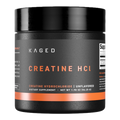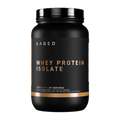Caffeine is one of the most extensively studied and effective performance-enhancing compounds.
Its benefits when consumed before a workout are well-documented, ranging from boosting energy levels to sharpening mental focus.
Yet it’s not just energy. Research consistently demonstrates that caffeine supports various aspects of exercise performance, from muscular endurance, strength, and power to sprinting capabilities, jumping ability, and a wide array of aerobic and anaerobic sport-specific actions.
A "one-size-fits-all" approach does not apply to caffeine supplementation.
In this article, we dive into the research on caffeine before working out, and help you decide the right dose for the right workout at the right time.
How Caffeine Works: A Quick Science Lesson
Caffeine's primary performance-enhancing actions stem from its interaction with adenosine receptors located throughout the brain and nervous system.
Adenosine is a naturally occurring chemical that accumulates in the body throughout the day, signaling fatigue and promoting relaxation and sleep.
Caffeine can bind to these same receptors. By occupying these receptor sites without activating them, caffeine effectively blocks adenosine from exerting its "slowing down" effect, thereby removing the natural brakes on neural activity.
Caffeine also influences the release of key neurotransmitters such as dopamine and norepinephrine, which further contribute to improved mood, sharper focus, and overall cognitive performance during exercise.
Finding Your Optimal Dose: What The Science Says
The most comprehensive review of the literature on caffeine comes from a 2021 review study in the International Society of Sports Nutrition.
Before we get into this research, which measures caffeine as milligrams per kilogram of body weight (mg/kg), here’s a chart to translate that into actual doses.
Caffeine Dosage by Body Weight
| Body Weight (lbs) |
Body Weight (kg) |
Low Dose (2 mg/kg BM) (mg) |
Moderate Dose (4 mg/kg BM) (mg) |
Upper Effective Dose (6 mg/kg BM) (mg) |
| 100 |
45 |
90 |
180 |
270 |
| 125 |
57 |
114 |
228 |
342 |
| 150 |
68 |
136 |
272 |
408 |
| 175 |
79 |
158 |
316 |
474 |
| 200 |
91 |
182 |
364 |
546 |
| 225 |
102 |
204 |
408 |
612 |
When it comes to performance, most research recommends caffeine consumption in doses ranging from 3 to 6 milligrams (mg) per kilogram (kg) of body mass (BM).
Some studies observe performance benefits with doses as low as 2 mg/kg body mass.
For individuals who are sensitive to caffeine, even a dose of 1-3 mg/kg can provide benefits.
Above 6mg/kg of body mass have not shown additional performance benefits. These higher doses often cause side effects, which can hinder performance.
Tailoring Your Caffeine Strategy: It Depends on You and Your Goals
Your caffeine strategy should vary based on a variety of factors. If you’re training to break a strength record, that’s different than hitting some steady-state cardio. If you’re a regular coffee drinker, that matters too.
Let's dive into this nuance.
Where to Start With Your Caffeine Dose
There’s a genetic component to caffeine tolerance. For instance, the efficiency with which the liver metabolizes caffeine or the sensitivity of adenosine receptors can impact how you handle caffeine.
With that in mind, 100-200mg is a sensible starting point (approximately 1.5-3 mg/kg BM).
It’s better to start too low and go up than start too high and experience negative side effects.
Increasing Your Caffeine Dose
If you find you can handle that dose well, then research suggests benefits from more caffeine, if your goal is max performance.
This is where the higher stim pre-workouts, like Kaged Pre-Workout Elite, come in.

The goal is to figure out what dose provides the right benefit for you without excess side effects.
How Habitual Caffeine Consumption Affects Its Impact
Some studies suggest that regular intake can lead to a degree of tolerance, potentially reducing the ergogenic benefits over time.
For competitive athletes aiming to maximize the ergogenic effect for a key event, a short period of caffeine withdrawal (e.g., 4-7 days) may help re-sensitize the body to its effects.
Workout Goals & Exercise Type
Higher or lower doses of caffeine seem to be more suitable to various workout goals. In general, for max strength and endurance, the upper end of the 6mg/kg dose seems suitable. For focus and cognition, a lower dose is effective.
Endurance
Caffeine has been shown to increase aerobic endurance in time-to-fatigue trials, improve time trial performance, and significantly reduce the perception of effort during prolonged activity.
Strength & Power
Caffeine has shown tangible benefits for muscular strength, mean and peak anaerobic power, jumping height, and movement velocity in resistance exercises.
Studies demonstrating these benefits typically utilize caffeine doses within the 3-6 mg/kg body mass range.
Focus & Cognitive Performance
Caffeine improves alertness, attention, vigilance, mood, and reaction time, while simultaneously reducing the perception of effort and pain.
This cognitive boost can be advantageous for skill-based sports or maintaining concentration throughout extended workouts.
For primarily cognitive benefits, lower doses, typically around 100-200 mg, can be quite effective.
Timing Your Caffeine for Peak Performance
The timing of caffeine consumption is nearly as important as the dosage itself. Caffeine at 11pm and 11am will have very different side effects.
For most common forms of caffeine, the most frequently recommended timing is approximately 30–60 minutes before the exercise session.
This timeframe allows sufficient time for caffeine to be absorbed into the bloodstream and reach its peak concentration, which typically occurs between 40 to 80 minutes post-ingestion.
This timing can vary based on the caffeine source.
Beware of Late Afternoon and Evening Caffeine Use
Consuming caffeine too close to bedtime can severely interfere with the ability to fall asleep and compromise overall sleep architecture, which is fundamental for muscle recovery and subsequent performance.
Experts generally advise avoiding caffeine intake 8 to 12 hours before the planned bedtime.
This creates a trade-off between maximizing immediate workout performance and ensuring adequate recovery.
For those with evening training schedules, a stimulant-free pre-workout or a lower dose of caffeine earlier in the day might represent a more suitable and sustainable option.
Caffeine cannot compensate for poor rest
Strategies to Minimize Side Effects
-
Start Low, Go Slow: Begin with the lowest effective dose, such as 100-150 mg or 1.5-2 mg/kg BM, and only gradually increase if needed and well-tolerated.
-
Stay Hydrated: Caffeine can exert a mild diuretic effect. Adequate fluid intake, especially water, is essential to counteract potential dehydration and reduce the likelihood of jitters.
-
Mind Your Timing: As previously discussed, consuming caffeine too close to bedtime should be avoided to prevent sleep disruption, which is crucial for recovery.
-
Strategic Withdrawal: For competitive athletes, 4-7 days with lowered caffeine can help restore sensitivity and maximize its impact. These caffeine cycling strategies have become more popular.
-
Prioritize Sleep: You can’t "outcaffeinate" poor sleep.
Kaged Supplements for All Caffeine Needs

Our goal is to empower people with science-backed knowledge to make the most informed choices for their bodies and their training goals.
That’s why Kaged Pre-Workouts have an array of caffeine levels, from 0 to 388mg.
All of our caffeinated supplements use organic caffeine, not synthetic. Learn why in this blog post on organic vs synthetic caffeine.
Pre-Workout Sport: Great For Beginners
Pre-Workout Sport contains 188mg of caffeine per scoop. It’s great for newcomers and for experienced athletes who know they like moderate caffeine levels.

SHOP PRE-WORKOUT SPORT
Pre-Workout: For Intense Training
Our original pre-workout formula contains 274mg of caffeine. This is a research-backed dosed to support endurance and strength.
It’s available in a stim-free version.

SHOP PRE-WORKOUT
Pre-Workout Elite: For Your Most Intense Training
In response to research that showed benefits closer to the 6mg/kg range, we developed Pre-Workout Elite, with 388mg of caffeine.
It’s also available in a stim-free version.

SHOP PRE-WORKOUT ELITE
Clean Burn Powder
Clean Burn is our delicious drink to support healthy weight loss. With 166mg of caffeine, it’s ideal as a cardio supplement or coffee replacement.

SHOP CLEAN BURN
Caffeine Capsules
Finally, the most cost-effective and simplest option is to choose our organic caffeine capsules. They’re available in a 100mg and 200mg option, so you can customize your caffeine needs.

SHOP CAFFEINE CAPSULES







































